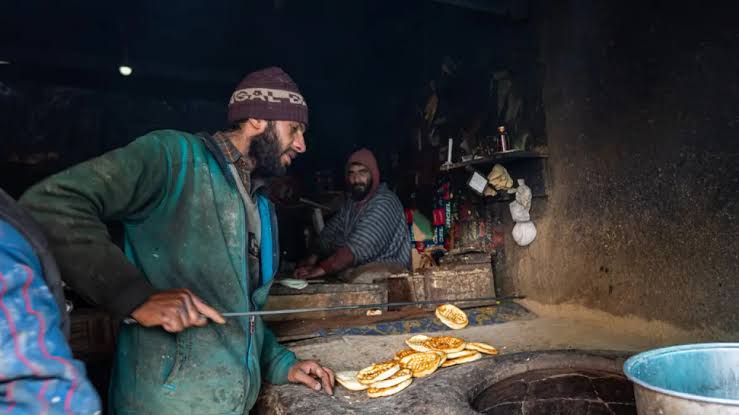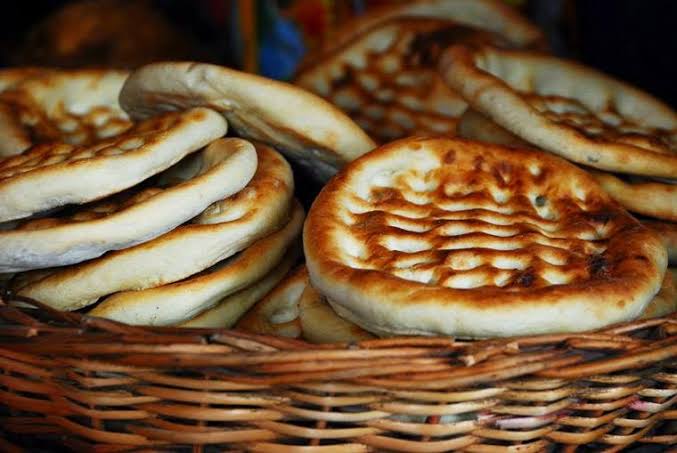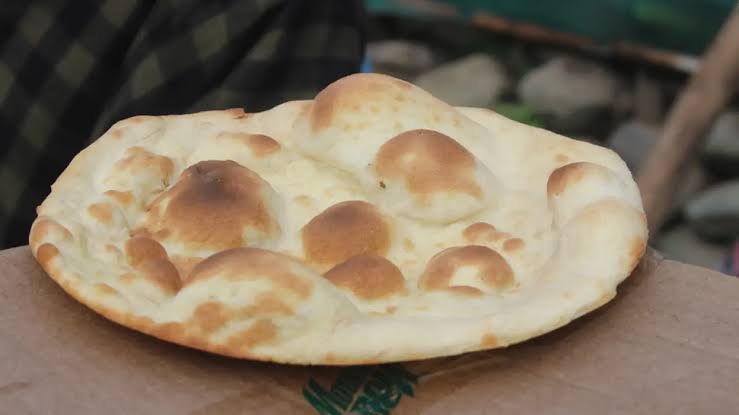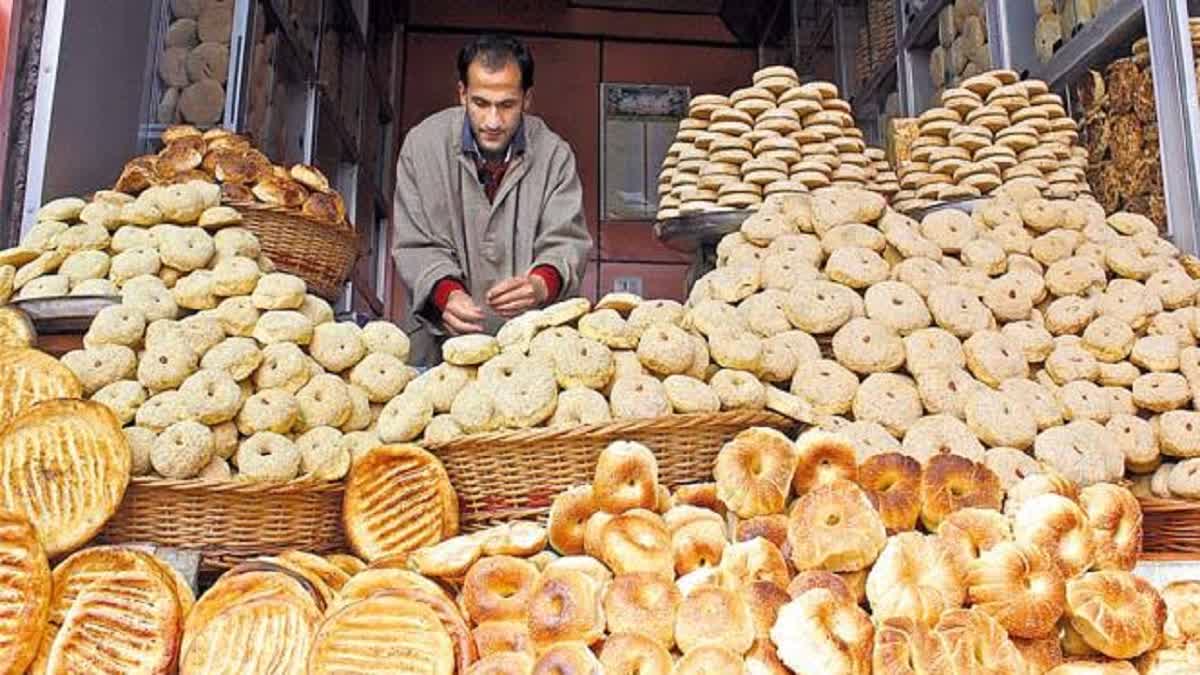Srinagar: A wave of public discontent is sweeping through Jammu and Kashmir following a sharp rise in the prices of essential commodities, especially traditional Kashmiri bread (Tchot or Tchochwor). Other daily essentials like mutton, vegetables, poultry, spices, and even daily services like hair salons have also seen significant price hikes, leaving many citizens struggling to cope with the escalating costs.
The price of a single piece of Kashmiri bread has doubled from Rs 5 to Rs 10, an increase that has been widely condemned as unfair and exploitative. Residents, especially from the poorer and middle-class sectors, are voicing their frustration, calling for immediate government intervention.
Consumers Express Outrage
Shida Akhter, a customer from the Batwara area of Srinagar, said the bakers’ community seems to be taking unfair advantage of people's needs. “Given rising inflation, it is understandable to increase the price of Rs 5 to Rs 7, but it is beyond understanding to increase the price of Rs 5 bread to Rs 10 at once,” he said.
Another Srinagar resident, Imtiyaz Ahmad, said the price rise would affect one as traditional bread or rotis (Tchot or Tchochwor) are basic food items in every Kashmiri home. “Many people won’t be able to afford it regularly. In such a situation, the current government must intervene in the important issue,” he said.
In response to public reactions, President of All Jammu and Kashmir, Bread Makers and Local Bakers Union Abdul Majeed Pampuri justified their move to increase prices.
“We are forced to hike the prices because the price of the flour, which is the main ingredient in the bread, has increased by Rs 800 per quintal. Similarly, firewood prices have reached 1500 to 1600 per quintal,” he said. “How will a baker make a 30-gram bread worth Rs 5? And what will the buyer eat? Therefore, we are forced to make 60 grams of bread for 10 rupees.”
He further said that regarding this issue they would meet the Divisional Commissioner of Kashmir today and also put their demands before him.

The Essential Commodities Act, which regulates the pricing of goods critical to daily life, is being perceived as inadequately enforced. The soaring prices of essential items have sparked demands for stricter implementation of this act to prevent unfair profiteering.
The prices of traditional Kashmiri bread (tchot), meat, and vegetables were fixed by the Department of Consumer Affairs and Public Distribution. But under a decision of 2023, that authority has been taken away from the department.
ETV Bharat tried to contact the Director of Consumer Affairs, Abdul Rashid War, to take his version over the issue of the price rise of traditional bread, but he did not answer calls when this report was published, despite repeated attempts.
Mohammad Sadiq Baqal, President of the Kashmir Traders and Manufacturers Federation (KTMF), expressed strong opposition to the price hikes. “We are not against fair trade, but these extortionate price increases are unacceptable. The poorest and most vulnerable are bearing the brunt. We urge the Jammu and Kashmir Government, led by Chief Minister Omar Abdullah, to intervene immediately.”
In addition to the impact on consumers, local businesses have been suffering due to economic disruptions, inflation, and lack of regulatory support. Many small traders and service providers have been forced to shut down, exacerbating the region's unemployment crisis.
Javid Ahmad Malik, a local, said that the economic strain from unchecked inflation and inconsistent policies has crippled local businesses and created further job losses. “If left unaddressed, the situation will worsen, affecting both consumers and traders,” he said.

Traders Oppose Price Hike
The outrage has united local communities and trade bodies, calling for swift government action. Senior trade leader Mohammad Yaseen called the price hikes “exploitative” and “cruel,” particularly for families already struggling with rising living costs.
Bashir Ahmad Kinoo, President of the Shahr-e-Khass Traders and Chamber (SKT&C), raised concerns over the lack of transparency regarding the bread price hikes. “While the associations claim that these rates are valid, they have failed to provide any authenticated stamps, contact details, or clarity on whether a government entity has approved these hikes,” he said.
He also questioned the collection of Rs 500 from each bread maker shop. This raises a critical question: “Where are these funds going, and is there any accountability for their usage? The bread makers’ associations must provide clarity on how these funds are being utilised and if there is any oversight in place.”
To alleviate the crisis, the KTMF, SKT&C, and affected citizens have proposed the following several measures. “We demand an immediate rollback of price hikes and revocation of bread prices to Rs 5 per piece, with future increases capped at Rs 1 after thorough review,” they said.
The business groups also recommended strict price regulation by establishing robust monitoring to prevent exploitative pricing practices. “Enforcement of the Essential Commodities Act by taking legal action against violators of pricing regulations besides regular quality checks,” they said.
The general public and traders are urging the Department of Food, Civil Supplies & Consumer Affairs (FCS&CA) and the administration to take decisive action. With the cost of living steadily rising, ensuring access to affordable essentials is crucial for maintaining public trust and social harmony.

About Traditional Kashmiri Breads
Bread is an essential component of Kashmiri cuisine, and Kashmiris have a particularly unique bond with it, even if rice is still a staple food.
There are Kandur, or bakers, on every street, with their establishments, called ‘Kander Waan,’ present in every locality and are more than just simply shops; they are a kind of social centre where greetings and talks take place.
A typical winter morning might start with a freshly baked 'Kander Tchot' or 'Girdi' from your neighbourhood baker, followed by a steaming hot cup of ‘noon chai’ (salted tea). In the afternoon, the ‘Tchot’ is replaced with 'Tchochwor,' a doughnut-shaped traditional muffin, and another sort of popular bread.
Read More



